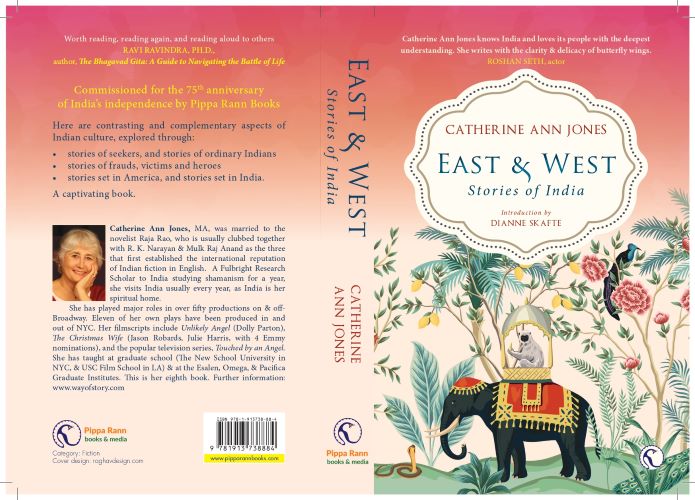A book that explores contrasting and complementary aspects of Indian culture

Team L&M
East & West – Stories of India by Catherine Ann Jones (Published by Pippa Rann Books & Media) is a captivating book, in which contrasting and complementary aspects of Indian culture are explored through stories of seekers, and ordinary Indians; stories of heroes, frauds, and victims; stories set in America, and stories set in India. Commissioned to celebrate the 75th anniversary of India’s independence, the book is delightful and easy read.
Following is an EXCERPT from the chapter Laksmi’s Treasure (Page 289-292):
God could not be everywhere and therefore, He made mothers.
Anonymous
Punjab is situated between Pakistan on the west, Kashmir on the north, and Rajasthan on the south. Hinduism in the Punjab dates from ancient times
when India’s great epic, the Mahabharata was composed two thousand and five hundred years ago, or possibly even earlier. In 1947, when India won her independence from British rule, Punjab Province was partitioned along religious lines, West Punjab going to Pakistan and East Punjab going to India. Huge numbers of people were displaced, and there was much intercommunal violence resulting in around one million being killed. Following independence, and due to the ensuing communal violence and fear, most of the Sikhs and Punjabi Hindus who found themselves left in Pakistan migrated to India.
Punjab is the third largest agricultural producing state in India, but due to the increasing laws favoring multi-national corporations, the small farmers are amassing great debt and, all too often, losing their farms.
Lakshmi’s husband, a farmer in the Punjab, had died, leaving her a widow with their five-year old son, Ravi. Lakshmi’s mother had also died, so Lakshmi lived with her father who struggled to earn a living on his small, inherited farm. After centuries using their own indigenous seeds, farmers now were required to buy GMO seeds from corporate companies and grow wheat, selling at lower prices. The corporate pesticides they were forced to use were not working, only creating bigger and stronger pests, and often causing sickness and death among the farm workers themselves.
As with many other farmers, Lakshmi’s father struggled in order to support his widowed daughter and her young son. Lakshmi’s late husband had been accidentally crushed to death in Delhi when thousands of farmers had gathered in protest against the corporate control of their farms, seeking a return to planting their own seeds as their fathers and grandfathers and great- grandfathers had always done.
One evening, after a simple meal of chapatti and dahl and after Ravi had gone to sleep, Lakshmi was washing the tiffin. Her father, exhausted and not well, looked at his daughter, and said, “Lakshmi, I have been thinking.”
“Yes, Papa?”
“About you and Ravi.” “Yes, Papa?”
“For your sakes, my child, you must leave this place. Go to a town or city, and find work.”
“Papa? Leave home?”
“Yes, daughter, to survive, you must leave. There is no hope here.”
Lakshmi looked down and tried not to weep. After collecting herself, she said, “No, Papa, I won’t leave you. I cannot.”
Her father shook his head then went to his bedding on the floor, and lay down to sleep.
The next morning, Lakshmi made rice gruel, and all ate in silence before her father went to the fields. When rolling up the bedding, Lakshmi noticed that her father had forgotten to take his pocket watch. His own father had given him the watch, and though only silver plated, he valued it highly. She laid it aside, planning to give it to him that evening when he returned from the fields.
After Ravi bathed and was dressed, as every morning, they sat, and Lakshmi taught him his letters. Ravi was bright like his good father. She would make sure that he would study well to have a better life.
Ravi enjoyed learning and knew that it pleased his mother. What love can compare with a mother’s love? Lakshmi gently smoothed Ravi’s sometime unruly hair.
“You are my treasure, did you know that?
Ravi, smiling and shy, bobbed his head from side to side indicating ‘yes’.
The darkness came. June had already ended and still no rain. The fields were thirsty, yet the monsoon was late again this year. She could see that Ravi was hungry, but they would wait for Papa. After two hours passed, she decided to go ahead and feed her son, and then she would wait for her father.
Another hour passed, Ravi was now asleep, and Lakshmi was worried. She peered outside their small house, searching for some sign of her father’s return. Suddenly, a young man was running toward her, calling her name. It was Arman, a farmer her own age who lived not far from them.
“Arman? Arman? What is it?”
Arman stopped running and stood silent before her, not knowing what to say.
“What is it? Where is my father? Have you seen him?”
Arman bowed his head and nodded, still silent.

